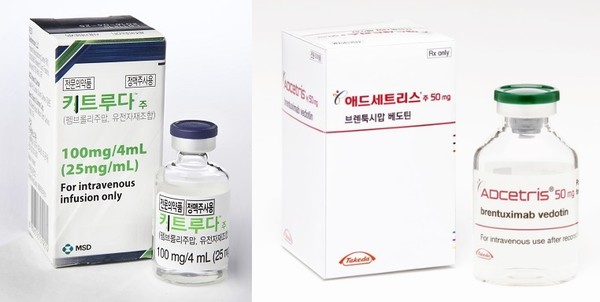MSD’s anti-PD-1 immunotherapy Keytruda (pembrolizumab) offered much more benefit than Takeda’s Adcetris (brentuximab vedotin) in progression-free survival and quality of life in relapsed/refractory classical Hodgkin lymphoma (cHL), a study showed.
The latest issue of Blood Advances, published by the American Society of Hematology, released patient-reported outcomes of the phase 3 KEYNOTE-204 trial of Keytruda.

KEYNOTE-204 is a global trial that randomly administered Keytruda and Adcetris to 304 patients with relapsed/refractory cHL aged 18 or more, registered at 78 institutions in 20 countries. The patients included those ineligible for autologous stem cell transplantation (ASCT) or who had relapsed after undergoing ASCT.
Earlier, the interim study results showed that Keytruda improved PFS compared to Adcetris.
During the median follow-up of 25.7 months, the median PFS in the Keytruda group was 13.2 months, versus 8.3 months in the Adcetris group. Keytruda reduced the risk of disease progression and mortality by 35 percent.
The latest data analyze the health-related quality of life (HRQoL) in patients who received at least one dose of study treatment and completed PRO assessment at least once.
“In the KEYNOTE-204 study in relapsed/refractory cHL patients, pembrolizumab alone was positive in efficacy and showed meaningful PFDS benefit compared to brentuximab vedotin alone,” the research team said.
As the treatment exposure was longer in pembrolizumab than in brentuximab vedotin, it was very important to assess HRQoL to check the effect of pembrolizumab during treatment, it emphasized.
For HRQoL assessment, the research team used the EORTC QoL Questionnaire Core 30 (QLQ-C30) and EuroQoL EQ-5D every six weeks until week 24 and every 12 weeks after that.
Prespecified endpoints included least squares mean (LSM) changes from baseline to week 24 and time to true deterioration (TTD) of 10 points or less decline from baseline.
Among 304 patients randomly assigned to either of the treatments, the result analysis included 146 Keytruda-treated patients and 150 Adcetris-treated patients. Both groups showed over 90 percent completion rate in QLQ-30 and EQ-5D.
Both treatment groups showed high compliance at baseline (>90 percent) and through week 24 (>80 percent).
However, completion rates decreased at each time point as patients discontinued treatment, mainly due to disease progression.
The results showed that global health status (GHS)/quality of life (QoL) scores improved through week 24 (7.29 points) in the Keytruda group, whereas the scores went down (minus 1.31 points) in the Adcetris group. In addition, the LSM value between the two groups was significantly different (8.6 points).
The Keytruda group also demonstrated a meaningful improvement in QLQ-C30 physical, role, and social domains, except for emotional and cognitive functioning.
Compared with Adcetris, Keytruda prolonged TTD for GHS/QoL (hazard ratio 0.40, P=.003) and each QLQ-C30 domain except cognitive functioning.
“In an exploratory analysis of PRO in the KEYNOTE-204 study, pembrolizumab improved HRQoL and prolonged TTD, compared to brentuximab vedotin,” the research team said.
The findings support the PRO’s usefulness in determining the difference in clinical outcomes in relapsed/refractory patients and indicate that pembrolizumab is related to better HRQoL than brentuximab vedotin, it emphasized.
In Korea, the government said it would broaden the reimbursement criteria for Keytruda use. As a result, patients with relapsed/refractory cHL will be eligible for Keytruda reimbursement in March at the earliest.
Based on the results of the KEYNOTE-204, the MFDS granted approval for Keytruda to treat adult and pediatric patients aged 2 or more with relapsed/refractory cHL who have failed autologous hematopoietic stem cell transplantation or who have failed at least two previous therapies and are ineligible for transplantation.
Recently, the Health Insurance Review and Assessment Service (HIRA) held a meeting of the drug insurance benefits review committee and said Keytruda would be reimbursable for the first-line lung cancer treatment and relapsed/refractory Hodgkin lymphoma.
Industry officials said MSD and the National Health Insurance Service (NHIS) was negotiating the price for Keytruda smoothly. They forecast that Keytruda’s expanded reimbursement will go through the meeting of the Health Insurance Policy Review Committee in February and become available in March in earnest.
As early as March, Keytruda and Adcetris are likely to compete in the Hodgkin lymphoma treatment market in Korea, observers said.

